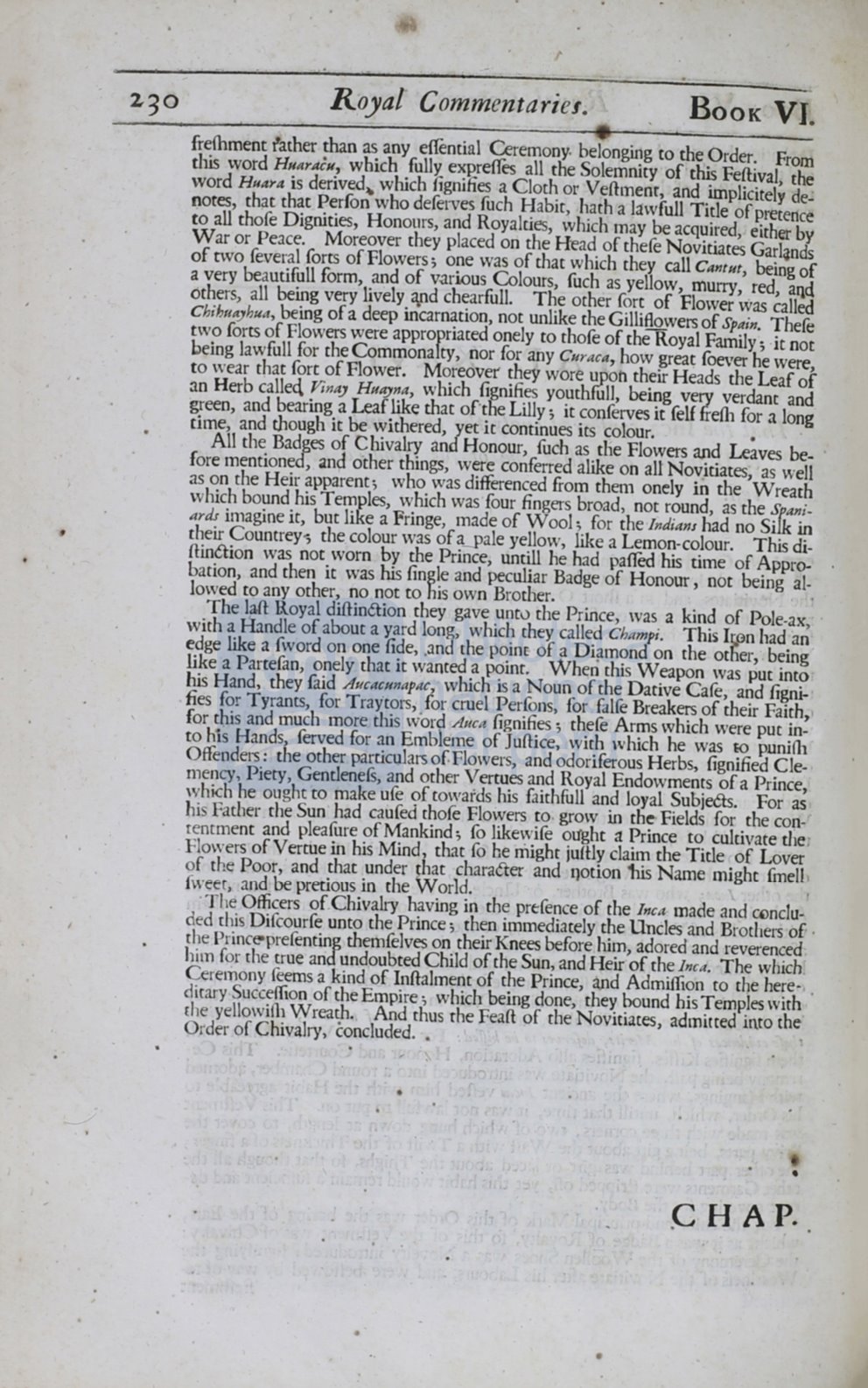

'
Royal Commentarie1.
BooK
VI.
freiliment father
than
as any eifential Ceremony. belonging to the Order. From
this word
HuarACu,
which
fully
exprclfes all the Solemnity of
this
Feilival the
word
Huara
is derived which fignifies a Cloth or Vefiment, and implicitely de–
notes, that that Perfon who deferves fuch
Habit,
hath a lawful! Title ofpretence
to all thofe Dignities, Honours, and Royalties, which may be acquired, either by
War
or Peace. Moreover they placed on the Head of rhefe Novitiates Garlands
of two feveral
forts
of Flowers; one was of that which they call
Cantut,
being
of
a very
beauti~ull
form, _and of various Colours, Cuch as yellow, murry, red,
aqd
others, all bemg very lively and chearfull. The other fort of Flower was called
Chih1Jayhua,
being ofa deep incarnation, not unlike the Gilliflowers of
Spain.
Thefe
two forts of Flowers were appropriated onely to thofe of the Royal Family; it not
being lawfull for the Commonalty, nor for any
Curaca,
how great foever he were,
to wear that fort of Flower. Moreover they
wor~
l!J)Oh their Heads the Leaf of
an Herb callee\
Pinay Huayna,
which fignifies youthfulJ, being very verdant and
green, and bearing a Leaf like that of toe Lilly ; it conferves
it
felf frefh for a long
time, and though
it
be withered, yet it continues its colour.
•
All the Badges of Cbivalry and Honour, fuch as the Flowers and Leaves be–
fore mentioned,
and
other things, were conferred alike on all Novitiates, as well
as on the Heir apparent; who was differenced from them onely in the W reach
which bound his Temples, which was four fingers broad, not round, as the
Sp_ani–
ards
imagine it, but like a Fringe, made of
Wool~
for the
Indians
had no Silk
in
rheir Countrey, the colour was ofa ale yellow, like a Lemon-colour. This di–
fiinetion was not worn by the Prince, untill he had pa{fed
his
time of Appro–
bation, and then it was
his
fingle and peculiar Badge of Honour , not being al–
lowed to any other, no not
to
his own Brother.
·
The laft Royal dillinCl:ion they gave unc0 the Prince, was a kind of Pole-ax>
with a Handle of about a yard long, which they called
ChamJi.
This I
cm
had an
edge like a fword on one fide, .and the poinc of a
Di~mond
on the odier, being
like a Partefan, onely that
it
wanted a point. When chis Weapon was put into
his
Hand, they faid
Aur:acunap1te,
which
is
a Noun of the Dative Cafe, and figni–
fies for Tyrants, for Trayrors, .for cruel Perfons, for falfe Breakers of their Faith,
for this and much more this word
Auca
fignifies ; thefe Arms which were put
in–
to his Hands, ferved for an Emblerne of Ju!Hce, with which he was
iO
punHh
Offenders: the other particulars ofFlowers, and odoriferous Herbs, fignified Cle–
mency, Piety, Gentlenefs, and other Vercues and Royal Endowments of a Prince,
which he ought to make ufe of towards his faithfull and loyal Subje&. For as
hi Father the Sun had caufed thofe Flowers
to
grow
in
the Fields for the con-
.
tenement and pleafure ofMankind ; fo likewife otfght
a
Prince to cultivate the
owers of Verrue
in
his Mind, that
fo
he might juHly claim the Title of Lover
of the Poor, and that under that charatkr and QOtion
1tls
Name might finell
{i
·eer
1
and
be
precious
in
the World.
·
..
The Officers of Chivalry having in the prtfence of the
Inca
made and oonclu–
ded this Difcourfe unto the Prince ; then immediately the Uncles and Brothers of ·
the
rinc prefenting themfelves on their Knees before him, adored and reverenced
him
~
r the true and undoubted Child of the Sun, and Heir of the
Inca.
The which
eremony feerns a kind of lnfialment of the Prince, and Admiffion to the here–
ditary Succeffion of the Empire; which being done, they bound his Temples with
the yellowifh Wreath. And thus the Feaft of the Novitiates, admitted into the
rder of Chivalry, concluded.
.
•
•
CH
AP.














